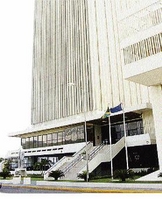BOJ says taxes will spur inflation - But central bank backs IMF path, deficit target
Published: Friday | May 22, 2009

Latibeaudiere
The Jamaican central bank is forecasting that price increases in the June quarter of the current fiscal year could more than triple the 1.3 per cent inflation out-turn for quarter ended March, fuelled in large measure by the impact of the more than $18 billion in new taxes imposed by the Government.
The Bank of Jamaica (BOJ) on Wednesday came out in support of the government's overtures for support from the International Monetary Fund (IMF) and urged adherence to the deficit target around which the 2009 to 2010 budget has been cast.
Despite the negative impact of the new tax measures, BoJ expects the early inflationary pressures, which it says, could be worsened by delayed effects of a 9.4 per cent fall in the value of the Jamaican dollar in the first three months of 2009 and a rise in world commodity prices - to taper off by year end.
The inflation forecast, given by central bank governor, Derick Latibeaudiere at a briefing at his Kingston offices Wednesday, places price increase expectations to June in the range of 4.0 per cent to 5.5 per cent. Inflation in the March quarter was 1.3 per cent.
Possible inflation figures
On the back of projections for some easing of the global economic crisis towards the end of the fiscal year, the BoJ says inflation could end up at between 11 per cent and 14 per cent for the fiscal period, within the same ball park as the 12.4 per cent headline inflation for the 2008/2009 year.
But central bank's inflation forecast could the shattered if the Government falls short of its programmed 5.5 per cent budget deficit, the central bank chief made clear.
"When we did the assessment of resources generally, (we concluded that) if the 5.5 per cent fiscal deficit was attained during the course of the year, it could provide us with a fighting chance to stabilise the system because there would be just about enough resources there for both the Government and the private sector to just about meet their financing needs," Latibeaudiere said.
He warned, however, that fiscal indiscipline, including higher than budgeted public sector wage costs, could spark inflation and higher interest rates, pointing out that an interest rate structure is determined by the demand for resources.
"There isn't much scope beyond that because any deviation indemand from either private or public sector would put pressure on prices, and some of the prices include interest rates."
It is in the context of fiscal discipline that the central bank has thrown its support behind government's talks with multilaterals including the IMF, noting that a Fund was now in the island to look at Jamaica's financial programme before making recommendations to the Government about the type of arrangement it might enter.
"It has become highly fashionable across the world for countries to enter into precautionary programmes with the IMF," Latibeaudiere said, adding that the closure of credit markets has increased the need for countries such as Jamaica to rely on multilaterals including the IMF.
While pointing out that the IMF appears to have departed from structural adjustment type policy prescriptions of the past, the BOJ head suggested that the role of the IMF has been misunderstood in Jamaica.
"I believe a lot has been misunderstood about IMF prescriptions. Prescriptions are only in relation to your own resource shortfalls. Why the IMF would have taken a battering in the past is that they have simply said well you can only borrow 'x' amount, so therefore you need to cut demand," said the central bank chief.
"What is disconcerting to people is that in cutting the demand you have to take the harsh medicine, but if you think about it, you have to take the harsh medicine if you can't borrow the money because ultimately you can't spend more than you have."
Meanwhile, the BOJ is reporting success in its attempts to put the brakes on the Jamaican dollar slide.
The local currency ended the quarter losing 9.4 per cent of its value, following a 9.7 per cent decline in the previous three months as part of a 20 per cent deterioration over the fiscal year.

BOJ
According to the BoJ, during the quarter, its three percentage points hike to 14 per cent in the cash reserves, the amount of money deposit taking institutions are mandated to park at the central bank, and more stringent foreign exchange surrender requirements for the banks and cambios, helped to ease liquidity pressures. Commercial banks are now required to give up to the BOJ, 15 per cent of all and 10 per cent of all US dollar purchases, while the surrender requirement for cambios is 10 per cent.
These measures, coupled with a rationalisation of public sector demand, the BoJ head said, resulted in January's 6.5 per cent devaluation slowing to 2.5 per cent in February and 0.6 per cent in March.
The fourth-quarter decline was put at between two per cent and three per cent by the BOJ, which is predicting a worsening of the situation to between three and four per cent for the June quarter as well as for the 2009/2010 fiscal year.
















